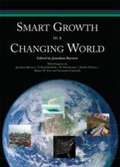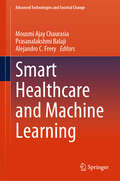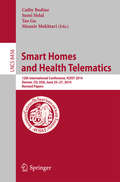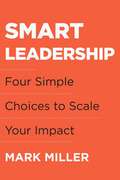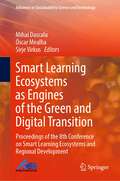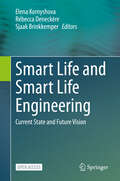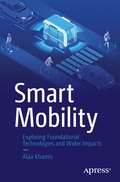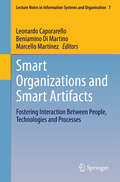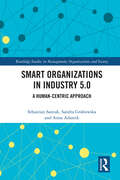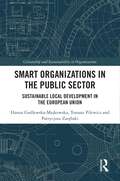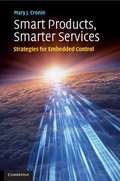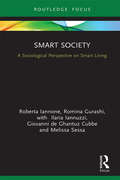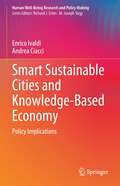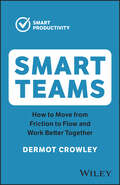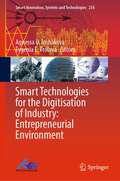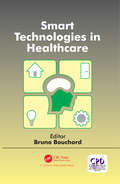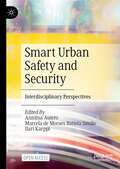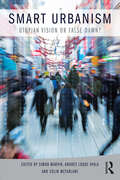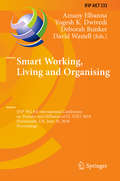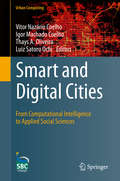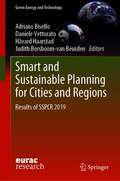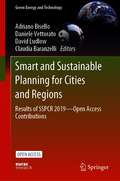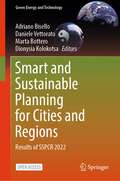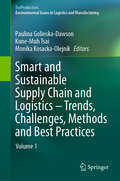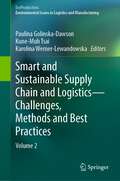- Table View
- List View
Smart Growth in a Changing World
by Jonathan BarnettSmart Growth in a Changing World, the latest book from respected planner and urban designer Jonathan Barnett, documents the United States' hidden crisis and shows how balanced transportation and natural resources preservation can make new urban development sustainable, as well as more efficient and more equitable.
Smart Healthcare and Machine Learning (Advanced Technologies and Societal Change)
by Alejandro C. Frery Mousmi Ajay Chaurasia Prasanalakshmi BalajiThe book explores the convergence of healthcare and cutting-edge technology, making it a captivating subject for readers interested in future research. Smart healthcare with machine learning techniques offers a transformative paradigm that utilizes the power of new technology, data analytics, and interconnected devices to enhance the quality, efficiency, and accessibility of healthcare services. This involves leveraging Internet of Things (IoT) devices, wearable technology, and machine learning algorithms to monitor patient health, predict medical conditions, and offer personalized treatment recommendations. This innovative combination not only enhances diagnostics and treatment but also addresses the research challenges of healthcare access and delivery in an increasingly connected world. By exploring the synergy between smart healthcare and machine learning, the book helps to understand how these technologies can collaborate to revolutionize patient care and healthcare delivery. This book is an outcome with applications of future technologies to overcome the toughest humanitarian challenges from an engineering approach.
Smart Homes and Health Telematics
by Cathy Bodine Sumi Helal Tao Gu Mounir MokhtariThis book constitutes the thoroughly refereed post-conference proceedings of the 12th International Conference on Smart Homes and Health Telematics, ICOST 2014, held in Denver, CO, USA in June 2014. The 21 revised full papers presented together with three keynote papers and 9 short papers were carefully reviewed and selected from numerous submissions. The papers are organized in topical sections on Design and Usability, assistive and sentient environments, cognitive technology, activity recognition, context and situation awareness, Health IT and short contributions.
Smart Leadership: Four Simple Choices to Scale Your Impact
by Mark MillerEscape the mediocrity that ensnares so many in business and become a better, more effective leader. Have you ever wondered what it would take to be a better leader, or achieve your wildest dreams, or make a bigger difference in the world? The answer lies in the choices you make: about everything from how you spend your time to the way you view the world. Smart Leadership is the latest essential business title from internationally bestselling author of Win the Heart and Chess Not Checkers Mark Miller. In this book, he shares the four research-based &“smart choices&” the best leaders make to scale their influence and results. By teaching you how to Confront Reality, Grow Capacity, Fuel Curiosity, and Create Change, Miller will help you: Bring fresh eyes and fresh thinking to your leadership approach. Increase your confidence in your ability to make a difference. Lead at levels you never thought possible. Accelerate your learning curve so that all these benefits come faster and more naturally. With this guide, your leadership—and your life—will be transformed forever.
Smart Learning Ecosystems as Engines of the Green and Digital Transition: Proceedings of the 8th Conference on Smart Learning Ecosystems and Regional Development (Advances in Sustainability Science and Technology)
by Óscar Mealha Sirje Virkus Mihai DascaluThe book brings together the contributions of the 8th International Conference on Smart Learning Ecosystems and Regional Development aimed at promoting reflection and discussion on the relevance of smart learning ecosystems for regional development and social innovation (e.g., schools, campuses, working places, informal learning contexts) and on how the effectiveness of the relation of citizens and smart ecosystems can be boosted. This forum is interested in understanding how technology-mediated instruments can foster the citizen’s engagement with learning ecosystems and territories, namely by understanding innovative human-centric design and development models/techniques, education/training practices, informal social learning, innovative citizen-driven policies, technology-mediated experiences, and their impact. This set of concerns contributes to fostering the social innovation sectors and ICT, economic development, and deployment strategies alongside new policies for smarter proactive citizens.
Smart Life and Smart Life Engineering: Current State and Future Vision
by Sjaak Brinkkemper Elena Kornyshova Rébecca DeneckèreThis open access book defines the field of Smart Life and Smart Life Engineering, identifying a clear scope of what constitutes “smart” in the context of digital technologies, develops a cross-field perspective, provides insights into various related disciplines, and offers illustrative examples of existing works in the field. To this end, it contains thirteen chapters divided into four parts: “Fundamentals of Smart Life and Smart Life Engineering” begins with an exploration of the concept of Smart Life, defines a detailed taxonomy of smart applications and their evolution over time, and, finally, delivers a comprehensive review of social, behavioral, and ethical considerations. Next, “Conceptual Contributions to Smart Life” explores innovative ideas in smart environment, smart home, smart city, and smart tourism. Subsequently, “Smart Life Applications” examines real-world implementations and their impact on various domains including viticulture, elevators, and overtourism. Eventually, “Experience Reports of Smart Life Applications” presents smart city experiences of the cities of Leuven and Monserrate respectively. Written for researchers and industrial professionals from a very large set of fields, this book explores the fascinating domain of smart technologies and their impact on our daily lives and brings together the works around societal, methodological, and technological aspects of Smart Life.
Smart Mobility: Exploring Foundational Technologies and Wider Impacts
by Alaa KhamisEach year we witness several paradigm shifts in mobility systems and services, increasingly so as technology progresses. The future of mobility is people-centric, software-defined, connected, and electric. Now more than ever, it is imperative for current and aspiring leaders in the field to understand the foundations of people-centric smart cities with a focus on sustainability. Smart Mobility offers a holistic view of the current and emerging smart mobility systems and explores their foundational technologies, technology enablers, and disruptors. Author Alaa Khamis acknowledges the need for smart mobility arising with growing world urbanization, and the impact of this on public health, congestion, and climate change. Khamis expertly interrogates how a focus on smart mobility can mitigate all of these risks using his triad of complementary factors: technology, governance, and city planning. In this book you’ll study how foundational technologies such as artificial intelligence, blockchain, the Internet of Things, robotics, and many more all work together to allow for smart mobility in our modern era. Khamis additionally covers the topical events of the COVID-19 pandemic and analyzes its impact on consumer behavior and the expected short-term disruptions and longer-term structural changes. The socioeconomic changes in our urban centers are vast, and Smart Mobility breaks down the core concepts with meaningful data and insights.What You Will LearnExplore different mobility modes, including mobility-as-a-service, shared mobility, mobility on demand, the gig economy and the passenger economyCover how the smart mobility triad - technology, governance, and city planning - work together to create a smart and sustainable mobilitySee how the COVID-19 pandemic is impacting consumer behavior and preferences and changing the future of mobilityWho This Book Is ForWorking professionals, students, researchers, technologists, city planners, and the curious layman.
Smart Organizations and Smart Artifacts
by Beniamino Di Martino Leonardo Caporarello Marcello MartinezThis book offers a multidisciplinary strategy for finding new and more effective human-computer interaction approaches, in particular from a socio-technical perspective, that facilitate the exploration and exploitation of benefits that information technologies (IT) offer organizations. Though the relationship between IT and organizations is certainly very strong, it is also one of the greatest obstacles to securing benefits from their interaction. The participation of organizational users in the planning and design stages of IT interfaces is the main area of human-computer interaction, where a wealth of contributions are positively enriching both the academic and management discussions. Thus, a new approach for managing this relationship is needed, one in which the different stakeholders are suitably taken into account. Moreover, the outstanding success of the 2. 0 phenomenon offers an example of a relevant platform where human-computer interaction has been widely developed and exploited. Consequently, this will influence and already is influencing - the way IT and users interact with each other. The book is based on a selection of the best papers - original, double blind peer-reviewed contributions - from the annual conference of the Italian chapter of the AIS, held in Milan, Italy in December 2013.
Smart Organizations in Industry 5.0: A Human-centric Approach (Routledge Studies in Management, Organizations and Society)
by Sandra Grabowska Sebastian Saniuk Anna AdamikThe Fourth Industrial Revolution means the widespread digitization of economic processes using more economical and efficient production technologies. Orientation towards productivity, flexibility and low production costs results in a slow process of dehumanization of industry and focus only on implementing digital technologies of Industry 4.0. A natural consequence of this trend is the concern of workers, governments and societies about new challenges and the role of humans in industry and the economy. The hope is the emergence of a new industry concept proposed by the European Commission that expands the features of the existing Industry 4.0 concept to include human-centric, environmental and resilience aspects in smart organizations. Industry 5.0 is an excellent alternative to the development of today’s digital and dehumanized world, and this book presents challenges and priority directions for smart organizations in an environment shaped by the pillars of Industry 5.0. This research volume discusses the development of technologies that support human-oriented work systems, sustainable production and system resilience in intelligent organizations. It presents an educational challenge for universities and vocational schools in preparing employees for intelligent organizations and will be of interest to researchers, academics, policymakers, and students in the fields of organizational studies, knowledge management and the digital economy.
Smart Organizations in the Public Sector: Sustainable Local Development in the European Union (Citizenship and Sustainability in Organizations)
by Hanna Godlewska-Majkowska Tomasz Pilewicz Patrycjusz ZarębskiHow does a smart organization model enable self-governments to lead local and regional development in a sustainable and resilient manner? What are key aspects of smart organizations impacting the success of self-governments in attracting and retaining residents, entrepreneurs, and investors? Smart organizations became a relevant construct in economic and management sciences. They supply many practical applications for self-governments and public sector organizations that are looking for effective ways to leverage their resources and capabilities in the local and regional development process. This research monograph indicates how factors of smart organizations in local administration lead to sustainable and resilient development processes. In parallel, the monograph is a practical guide for local government managers looking for the best, international practices in collecting, researching, and interpreting data for making decisions that influence the competitiveness and market position of locations they govern.
Smart Products, Smarter Services: Strategies for Embedded Control
by Mary J. CroninWe are surrounded by products that have minds of their own. Computing power, in the form of microcontrollers, microprocessors, sensors, and data storage chips, has become so cheap that manufacturers are building connectivity and embedded intelligence into all types of consumer goods. These 'smart products' are fundamentally changing both the competitive landscape for business and the daily lives of consumers. This book analyzes the evolution of smart products to help managers understand the impact of embedded product intelligence on corporate strategy, consumer value, and industry competition. It describes four different ecosystem strategies for designing and launching smart products: the control-focused Hegemon, the standards-focused Federator, the high growth and brand-focused Charismatic Leader, and the disruptive industry Transformer. This ecosystem model is then applied to smart products in the automotive, wireless, energy, residential, and health industries. The book concludes with recommendations for successfully managing smart products and services.
Smart Society: A Sociological Perspective on Smart Living
by Romina Gurashi Roberta Iannone Ilaria Iannuzzi Giovanni de Ghantuz Cubbe Melissa SessaIncreasingly, we hear of ‘smart’ cities, communities, governance and people as constituting the basis of initiatives by which we might address various social and environmental problems, particularly those connected with sustainability, usually by means of an ‘intelligent’ connection with the ‘network society’. This book addresses the issues raised by the emergence of ‘smart’ dimensions and initiatives in society, critically engaging with questions surrounding the feasibility of what smart initiatives propose and the extent to which they can really offer solutions to the challenges we face. With attention to the notion of ‘smart’ as applied to the individual, the community, politics and the home, the authors consider the interconnections between these various facets of ‘smart living’ and their relationship to the notion of the smart society as a whole. Drawing on a concrete study of an attempt to concretize smart ideas in the design of a smart, solar home as part of an international project, Smart Society offers the first extended sociological engagement with the notion of smart living.
Smart Sustainable Cities and Knowledge-Based Economy: Policy Implications (Human Well-Being Research and Policy Making)
by Enrico Ivaldi Andrea CiacciThis book provides information and resources to city planners and other public policy officials on the importance of smart sustainable cities and their relationship with urban knowledge-based economy. It answers important topical questions relating to urban sustainable development and human well-being, namely, how can we implement policies and programs that can make cities “smart” and boost their knowledge-based development? How can such programs reduce inequalities and enhance the environment where people live and work? The authors suggest a new approach to the creation of sustainable smart cities, not only in metropolises but also in smaller urban spaces. They advance the body of knowledge in entrepreneurship literature by examining both the European regional understanding of entrepreneurship and the quality of life and well-being at city levels. They also provide synthetic indexes to assess the relationship between perceived quality of life and entrepreneurship. This book stimulates the debate on the role of smart cities in promoting entrepreneurship, which is a currently under-investigated topic in Europe, and is of interest to a wide range of practitioners, professionals and academics in the area of well-being and quality of life research, urban studies, public policy, and sustainable development.
Smart Teams: How to Move from Friction to Flow and Work Better Together
by Dermot CrowleyLearn how your team can communicate, congregate and collaborate more effectively than ever Smart Teams will help your team to go beyond personal productivity to build a culture where productivity thrives. This book shows you how to turn around the unproductive team behaviours that create friction. You’ll learn the ‘superproductive’ behaviours that promote flow and the most impactful productivity principles for working better together. Smart Teams shares the practical guidelines and key skills you need to lead a productive, cooperative team. Email noise, unproductive meetings and poorly organised projects can stifle creativity and disrupt everyone’s workflow. A culture that isn’t productive results in long hours, more stress, and a lack of balance. But by raising awareness of how our behaviours impact our work and our colleagues, you build the desire and capability to change within your team. This book is packed with tips, guidelines and expert insights for leaders and managers at any level. Foster a culture of ‘superproductivity’ Create a set of Smart Team principles to guide cooperation Run fewer, shorter and more effective meetings Collaborate more productively on projects Reduce urgency, interruptions and email noise People want their work to matter, they want to make an impact and they want to do it all with a healthy work-life balance. Productivity is the key to making it all happen! Smart Teams shows you how to implement the culture shift that will allow your team to flourish. This book is part of the Smart Productivity series, helping readers find practical solutions for better managing their time, energy and focus.
Smart Technologies for the Digitisation of Industry: Entrepreneurial Environment (Smart Innovation, Systems and Technologies #254)
by Agnessa O. Inshakova Evgenia E. FrolovaThis book discusses fusion of technology and body of knowledge through elaboration of theoretical concepts and conceptual frameworks to ensure the economic growth of the Russian Federation by utilizing the huge potential for innovation and entrepreneurship in Russia. The book presents recent research to solve the most challenging problems facing digitalization in the field of entrepreneurship in the country. Some of them need specialized personnel training; the considerable financial resources needed for the maintenance of digital technologies; how to market enterprises and organizations; and financial instruments designed to support industrial development. The proposed results will create the conditions for a systemic approach to tilting towards supporting new ventures through an improved regulatory framework—currently virtually absent in the field of entrepreneurship at the national level. The book defines prospects for investment in renewable energy sources, circulation of energy resources, and energy efficiency improvements to gain positive economic effects from the introduction of new technologies.
Smart Technologies in Healthcare
by Bruno BouchardAssistive technologies for the old and people with disabilities is now a very active field of research. It also constitutes a very profitable market (expected to reach US $60 billion p.a. by 2018). The book covers key aspects of this important field and provides guidelines for developing assistive technologies in smart environments. The book also presents the new paradigm of open innovation used by the most prolific research teams around the world. The latest developments in the field are given. Overall this book will be a reference for researchers, practitioners and engineers.
Smart Urban Safety and Security: Interdisciplinary Perspectives
by Anniina Autero Marcela de Moraes Batista Simão Ilari KarppiThis open access book explores the use of technologies for urban safety and security. Rather than focusing on the technologies themselves, it provides and in-depth analysis of the complex urban transformations linked to the increasing integration of technical systems in the built environment. Interdisciplinary contributions explain how technologies can improve urban safety, whilst offering a broader discussion relative to urban, socio-economic and political factors. Against simplistic techno-solutionist ideas, the authors illustrate the role of technology as means to an end and show how technologies can widen our understanding of safety and security. Readers are introduced to issues relative to the practical implementation, development, and testing of urban technologies via numerous case studies from cities around the world.
Smart Urbanism: Utopian vision or false dawn?
by Simon Marvin, Andrés Luque-Ayala and Colin McFarlaneSmart Urbanism (SU) – the rebuilding of cities through the integration of digital technologies with buildings, neighbourhoods, networked infrastructures and people – is being represented as a unique emerging ‘solution’ to the majority of problems faced by cities today. SU discourses, enacted by technology companies, national governments and supranational agencies alike, claim a supremacy of urban digital technologies for managing and controlling infrastructures, achieving greater effectiveness in managing service demand and reducing carbon emissions, developing greater social interaction and community networks, providing new services around health and social care etc. Smart urbanism is being represented as the response to almost every facet of the contemporary urban question. This book explores this common conception of the problematic of smart urbanism and critically address what new capabilities are being created by whom and with what exclusions; how these are being developed - and contested; where is this happening both within and between cities; and, with what sorts of social and material consequences. The aim of the book is to identify and convene a currently fragmented and disconnected group of researchers, commentators, developers and users from both within and outside the mainstream SU discourse, including several of those that adopt a more critical perspective, to assess ‘what’ problems of the city smartness can address The volume provides the first internationally comparative assessment of SU in cities of the global north and south, critically evaluates whether current visions of SU are able to achieve their potential; and then identifies alternative trajectories for SU that hold radical promise for reshaping cities.
Smart Working, Living and Organising: IFIP WG 8.6 International Conference on Transfer and Diffusion of IT, TDIT 2018, Portsmouth, UK, June 25, 2018, Proceedings (IFIP Advances in Information and Communication Technology #533)
by Yogesh K. Dwivedi David Wastell Amany Elbanna Deborah BunkerThis book constitutes the refereed proceedings of the IFIP WG 8.6 International Working Conference "Smart Working, Living and Organising" on Transfer and Diffusion of IT, TDIT 2018, held in Portsmouth, UK, in June 2018. The 17 revised full papers and 2 short papers presented were carefully reviewed and selected from 34 submissions. They deal with the adoption of new classes of technology used by individuals, organisations, sectors and society with a particular focus on how emerging technologies are adopted and appropriated in organisations and everday life and their impact. The papers are organized in the following topical sections: being smart: adoption challenges; sharing economy and social media; government and infrastructure; IT project management; and revisiting concepts and theories.
Smart and Digital Cities: From Computational Intelligence to Applied Social Sciences (Urban Computing)
by Vitor Nazário Coelho Igor Machado Coelho Thays A. Oliveira Luiz Satoru OchiThis book presents up-to-date information on the future digital and smart cities. In particular, it describes novel insights about the use of computational intelligence techniques and decentralized technologies, covering urban aspects and services, cities governance and social sciences. The topics covered here range from state-of-the-art computational techniques to current discussions regarding drones, blockchain, smart contracts and cryptocurrencies.The idealization of this material emerged with a journey of free knowledge exchange from a diverse group of authors, who met each other through four different events (workshops and special sessions) organized with the purpose of boosting the concepts surrounding smart cities.We believe that this book comprises innovative and precise information regarding state-of-the-art applications and ideas for the future of cities and society. It will surely be useful not only for the academic community but also to the industry professionals and city managers.
Smart and Sustainable Planning for Cities and Regions: Results of SSPCR 2019 (Green Energy and Technology)
by Judith Borsboom-van Beurden Håvard Haarstad Adriano Bisello Daniele VettoratoThis book offers a selection of research papers and case studies presented at the 3rd international conference “Smart and Sustainable Planning for Cities and Regions”, held in December 2019 in Bolzano, Italy, and explores the concept of smart and sustainable planning, including top contributions from academics, policy makers, consultants and other professionals. Innovation processes such as co-design and co-creation help establish collaborations that engage with stakeholders in a trustworthy and transparent environment while answering the need for new value propositions. The importance of an integrated, holistic approach is widely recognized to break down silos in local government, in particular, when aimed at achieving a better integration of climate-energy planning. Despite the ongoing urbanization and polarization processes, new synergies between urban and rural areas emerge, linking development opportunities to intrinsic cultural, natural and man-made landscape values. The increasing availability of big, real-time urban data and advanced ICT facilitates frequent assessment and continuous monitoring of performances, while allowing fine-tuning as needed. This is valid not only for individual projects but also on a wider scale. In addition, and circling back to the first point, (big) urban data and ICT can be of enormous help in facilitating engagement and co-creation by raising awareness and by providing insight into the local consequences of specific plans. However, this potential is not yet fully exploited in standard processes and procedures, which can therefore lack the agility and flexibility to keep up with the pulse of the city and dynamics of society. The book provides a multi-disciplinary outlook based on experience to orient the reader in the giant galaxy of smart and sustainable planning, support the transposition of research into practice, scale up visionary approaches and design groundbreaking planning policies and tools.
Smart and Sustainable Planning for Cities and Regions: Results of SSPCR 2019—Open Access Contributions (Green Energy and Technology)
by Adriano Bisello Daniele Vettorato David Ludlow Claudia BaranzelliThis open access book offers a selection of research papers and case studies presented at the 3rd international conference “Smart and Sustainable Planning for Cities and Regions”, held in December 2019 in Bolzano, Italy, and explores the concept of smart and sustainable planning, including top contributions from academics, policy makers, consultants and other professionals. Innovation processes such as co-design and co-creation help establish collaborations that engage with stakeholders in a trustworthy and transparent environment while answering the need for new value propositions. The importance of an integrated, holistic approach is widely recognized to break down silos in local government, in particular, when aimed at achieving a better integration of climate-energy planning. Despite the ongoing urbanization and polarization processes, new synergies between urban and rural areas emerge, linking development opportunities to intrinsic cultural, natural and man-made landscape values. The increasing availability of big, real-time urban data and advanced ICT facilitates frequent assessment and continuous monitoring of performances, while allowing fine-tuning as needed. This is valid not only for individual projects but also on a wider scale. In addition, and circling back to the first point, (big) urban data and ICT can be of enormous help in facilitating engagement and co-creation by raising awareness and by providing insight into the local consequences of specific plans. However, this potential is not yet fully exploited in standard processes and procedures, which can therefore lack the agility and flexibility to keep up with the pulse of the city and dynamics of society. The book provides a multi-disciplinary outlook based on experience to orient the reader in the giant galaxy of smart and sustainable planning, support the transposition of research into practice, scale up visionary approaches and design groundbreaking planning policies and tools.
Smart and Sustainable Planning for Cities and Regions: Results of SSPCR 2022 (Green Energy and Technology)
by Dionysia Kolokotsa Adriano Bisello Daniele Vettorato Marta BotteroThis open access book includes a selection of innovative contributions presented at the 4th international conference “Smart and Sustainable Planning for Cities and Regions 2022”, held in Bolzano, Italy in July 2022. Featuring 10 papers by academics and consultants, strongly rooted in practical experiences and international projects, it discusses current ground-breaking research in innovative and sustainable planning for cities, with a focus on the environmental, economic, and social challenges associated with the global sustainability transition and energy systems integration. The contributions are illustrative of the richness of the issues discussed and the breadth of the emerging themes, including innovative business models for building and infrastructure at district level, integrated sustainability assessment schemes for Positive Energy Districts, a material flow accounting model for regional metabolism, energy communities as a lever to promote historical and landscape values, optimized and electrified last-mile logistics, multi-criteria decision analysis tools to redefine center/periphery relationships, a framework for socio-spatial analysis related to social practices, design principles and communication technologies improving both indoor and outdoor public spaces, augmented nature-based solution coupling the green elements with the latest technologies to deliver healthier and more appealing cities.
Smart and Sustainable Supply Chain and Logistics – Trends, Challenges, Methods and Best Practices: Volume 1 (EcoProduction)
by Paulina Golinska-Dawson Kune-Muh Tsai Monika Kosacka-OlejnikThis book discusses the critical contemporary issues of sustainability and integration of physical and information flow. It explores the digitalization of logistics processes and the need for a more integrated and a seamless cooperation in supply chain management, which are dominant trends in business practice. Moreover, it examines how the pressure for CO2 emission reductions and more resource- efficient business models influences the organization of logistics operations on both a local and global scale, demonstrating that integrating physical and cyber systems is necessary to achieve a more environmentally friendly, safe logistics and supply chain operations. In the individual chapters, the authors discuss the new qualitative and quantitative theoretical methods and models and also analyze case studies from business practice. This book provides valuable insights for academics, Ph.D. students and practitioners wishing to deepen their understanding of logistics operations and management.
Smart and Sustainable Supply Chain and Logistics — Challenges, Methods and Best Practices: Volume 2 (EcoProduction)
by Paulina Golinska-Dawson Karolina Werner-Lewandowska Kune-Muh TsaiThe application of artificial intelligence methods and the increasing digitalization of the processes in a supply chain contribute the more seamless flow of materials and information. The disturbances in global supply chain during pandemic put pressure on companies to improve the existing operations. The Sustainable Development Goals put pressure on local and global markets to reduce carbon dioxide emissions and to implement a more resource-efficient business model. Integration of physical and cyber systems is necessary to achieve more environmentally friendly, efficient logistics and supply chain operations. This book presents the contemporary issues of sustainability and integration of physical and information flow in supply chain. In the individual chapters, the authors discuss new qualitative and qualitative theoretic methods, models and present case studies from business practice. This book might be a valuable source of knowledge for the academics, PhD students and practitioners to deepen their knowledge in the field of logistics and SCM.
